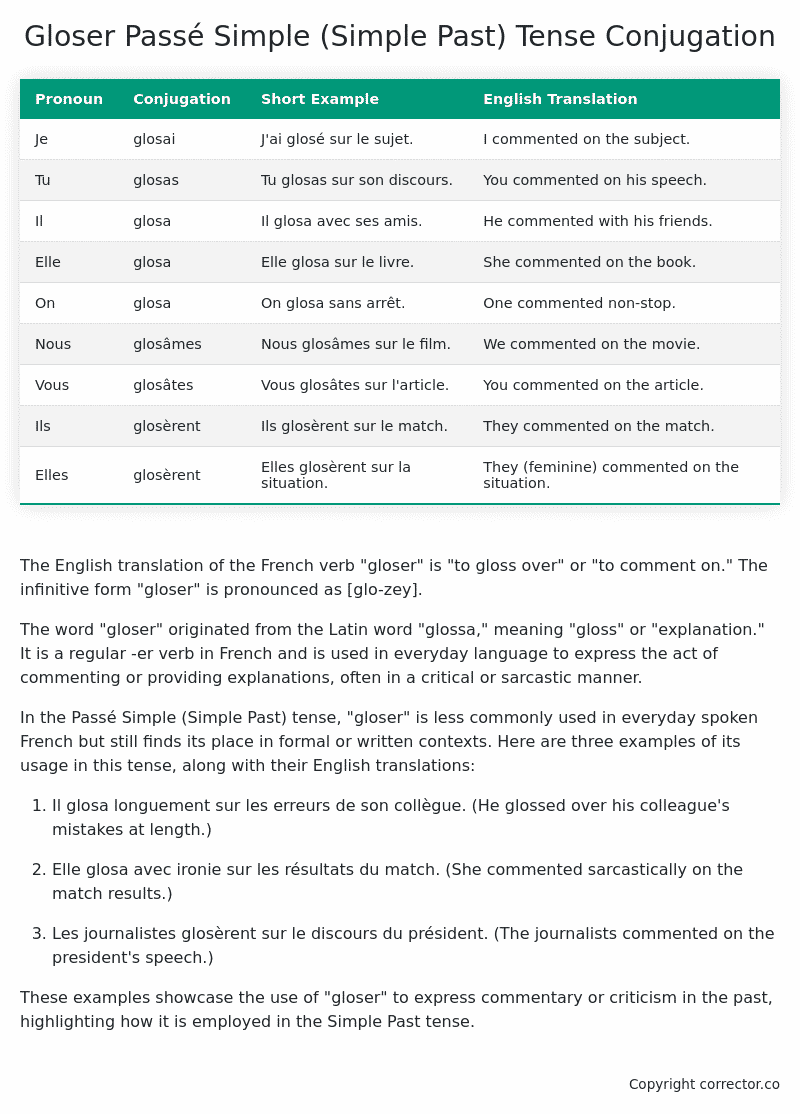Passé Simple (Simple Past) Tense Conjugation of the French Verb gloser
Introduction to the verb gloser
The English translation of the French verb “gloser” is “to gloss over” or “to comment on.” The infinitive form “gloser” is pronounced as [glo-zey].
The word “gloser” originated from the Latin word “glossa,” meaning “gloss” or “explanation.” It is a regular -er verb in French and is used in everyday language to express the act of commenting or providing explanations, often in a critical or sarcastic manner.
In the Passé Simple (Simple Past) tense, “gloser” is less commonly used in everyday spoken French but still finds its place in formal or written contexts. Here are three examples of its usage in this tense, along with their English translations:
-
Il glosa longuement sur les erreurs de son collègue.
(He glossed over his colleague’s mistakes at length.) -
Elle glosa avec ironie sur les résultats du match.
(She commented sarcastically on the match results.) -
Les journalistes glosèrent sur le discours du président.
(The journalists commented on the president’s speech.)
These examples showcase the use of “gloser” to express commentary or criticism in the past, highlighting how it is employed in the Simple Past tense.
Table of the Passé Simple (Simple Past) Tense Conjugation of gloser
| Pronoun | Conjugation | Short Example | English Translation |
|---|---|---|---|
| Je | glosai | J’ai glosé sur le sujet. | I commented on the subject. |
| Tu | glosas | Tu glosas sur son discours. | You commented on his speech. |
| Il | glosa | Il glosa avec ses amis. | He commented with his friends. |
| Elle | glosa | Elle glosa sur le livre. | She commented on the book. |
| On | glosa | On glosa sans arrêt. | One commented non-stop. |
| Nous | glosâmes | Nous glosâmes sur le film. | We commented on the movie. |
| Vous | glosâtes | Vous glosâtes sur l’article. | You commented on the article. |
| Ils | glosèrent | Ils glosèrent sur le match. | They commented on the match. |
| Elles | glosèrent | Elles glosèrent sur la situation. | They (feminine) commented on the situation. |
Other Conjugations for Gloser.
Le Present (Present Tense) Conjugation of the French Verb gloser
Imparfait (Imperfect) Tense Conjugation of the French Verb gloser
Passé Simple (Simple Past) Tense Conjugation of the French Verb gloser (You’re reading it right now!)
Passé Composé (Present Perfect) Tense Conjugation of the French Verb gloser
Futur Simple (Simple Future) Tense Conjugation of the French Verb gloser
Futur Proche (Near Future) Tense Conjugation of the French Verb gloser
Plus-que-parfait (Pluperfect) Tense Conjugation of the French Verb gloser
Passé Antérieur (Past Anterior) Tense Conjugation of the French Verb gloser
Futur Antérieur (Future Anterior) Tense Conjugation of the French Verb gloser
Subjonctif Présent (Subjunctive Present) Tense Conjugation of the French Verb gloser
Subjonctif Passé (Subjunctive Past) Tense Conjugation of the French Verb gloser
Subjonctif Imparfait (Subjunctive Imperfect) Tense Conjugation of the French Verb gloser
Subjonctif Plus-que-parfait (Subjunctive Pluperfect) Tense Conjugation of the French Verb gloser
Conditionnel Présent (Conditional Present) Tense Conjugation of the French Verb gloser
Conditionnel Passé (Conditional Past) Tense Conjugation of the French Verb gloser
Conditionnel Passé II (Conditional Past II) Tense Conjugation of the French Verb gloser
L’impératif Présent (Imperative Present) Tense Conjugation of the French Verb gloser
L’impératif Passé (Imperative Past) Tense Conjugation of the French Verb gloser
L’infinitif Présent (Infinitive Present) Tense Conjugation of the French Verb gloser
L’infinitif Passé (Infinitive Past) Tense Conjugation of the French Verb gloser
Le Participe Présent (Present Participle) Tense Conjugation of the French Verb gloser
Le Participe Passé (Past Participle) Tense Conjugation of the French Verb gloser
Struggling with French verbs or the language in general? Why not use our free French Grammar Checker – no registration required!
Get a FREE Download Study Sheet of this Conjugation 🔥
Simply right click the image below, click “save image” and get your free reference for the gloser Passé Simple tense conjugation!

Gloser – About the French Passé Simple (Simple Past) Tense
Formation
Usage
Narration
Historical Context
Interactions with other tenses
Passé Composé
Imparfait
Conditional and Subjunctive
Summary
I hope you enjoyed this article on the verb gloser. Still in a learning mood? Check out another TOTALLY random French verb conjugation!


